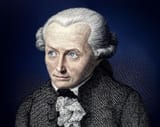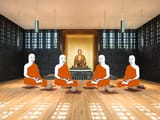With your brain, you can create any scenario, dialogue, system, landscape, and so on. Honestly, I don’t know how people don’t just sit around imagining things all day. You can LITERALLY imagine anything you want.

Esoterically, sensation is considered as a form of the mind rather than something external to it. Sensation is a mental construct, albeit, not necessarily a purely subjective one. A major problem of the exoteric Kantianism is the equating of mentation with subjectivity; esoteric Kantianism rejects this fixed idea of the normie standpoint. While exoterically, only the formal aspect of phenomena is attributed to the understanding, or rather, the mind, esoterically the content itself is also attributed to the mind; however, key here is to again recognize the crucial distinction between mind and subjectivity; both the form and content of phenomena are mental productions. Furthermore, this destroys the phenomena-noumena distinction as an absolute distinction; nonetheless, the distinction remains as a relative distinction; they are different but also the same. The exoteric Kantian would here gasp at what would to them appear to be a solipsistic reduction of the Kantion doctrine— but they are mistaken. Solipsism only results from the identification of mind with subjectivity. Indeed, mind is subjective, but it is (and here is the rub) also objective. There is no mind-independent reality; there is subject-independent reality, albeit not in the absolute, and only relative to the particular subjects.
This brings into the spotlight the esoteric nature of the core of transcendental idealism: the transcendental ideality of space and time, or specifically, the a priori nature of the space and time as the pure forms of the intuition of all objects of sense. Esoterically, space and time remain a apriori conditions of subjective experience, but they do so not because they are the subjective conditions of experience, but rather because they are the objective conditions of the Mind-world. The world, as an objective mind, possesses space and time as the form of its own objectivity, wherein it may populate itself with what subjectively is called sensation, but objectively is called matter.

